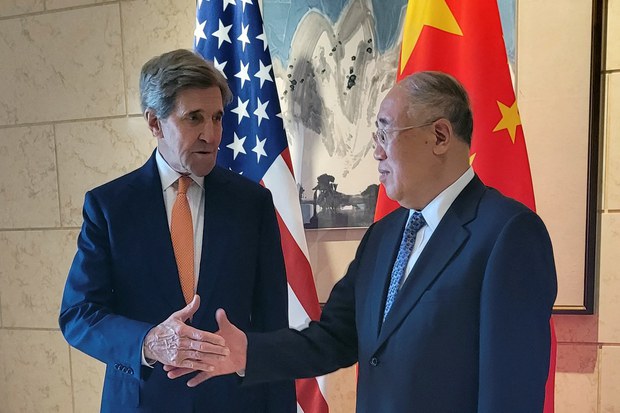Taking the heat: Kerry touches down in Beijing to negotiate emissions
Share

U.S. Special Presidential Envoy for Climate John Kerry shakes hands with his Chinese counterpart Xie Zhenhua before a meeting in Beijing, China July 17, 2023.
United States climate envoy John Kerry met with his Chinese counterpart Monday morning, having left one of northern America’s hottest months for one of Beijing’s hottest summers on a diplomatic mission to cool things down.
June was the hottest month on record, according to the World Meteorological Organization. On Sunday, Sanbao in Xinjiang Province hit 52.2 Celsius (126 Fahrenheit) and in Death Valley, California, the mercury hit 53.3 C (128 F), as Europe faces a record-breaking heat wave this week.
Kerry met with Xie Zhenhua on Monday in a conference room overlooking Beijing’s Forbidden City. Xie said that he and Kerry could play a role in improving U.S.-China relations.
Kerry said it was “imperative that China and the United States make real progress” in the four months before the COP28 global climate talks in Dubai begin.
Kerry also emphasized that it was essential that China partner with the U.S. to cut methane emissions and reduce the climate impact of coal-fired power.
“In the next three days we hope we can begin taking some big steps that will send a signal to the world about the serious purpose of China and the United States to address a common risk, threat, challenge to all of humanity created by humans themselves,” Kerry said.
“China and [the] U.S. share similar ideas and have a similar past in addressing climate change,” Xie said. “Together, the two nations have made progress,” Bloomberg reported.
Kerry is following on the tails of visits by U.S. Secretary of StateAntony Blinken and Treasury Secretary Janet Yellen.
On Thursday, Blinken met with China’s top diplomat Wang Yi on the sidelines of a summit in Jakarta, Indonesia.
Kerry said he hoped to have “candid conversations” with Chinese officials and see some progress on limiting emissions of greenhouse gasses and overcoming China’s addiction to coal by deploying renewable power.
China’s state broadcaster CCTV said there would be an “in-depth” exchange of views on cooperation to deal with climate change, after Kerry’s flight touched down.
Climate diplomacy experts cautioned not to expect a significant breakthrough such as the milestone 2014 agreement to cooperate that paved the way for the landmark Paris Agreement a year later. If the two nations could agree to revive a joint working group they agreed on in November 2021, the visit would be a success, experts said.
“A critical thing to observe in this visit, if there are further steps envisioned, what those steps are, and how explicit the steps will be laid out by both sides,” said Li Shuo, a policy adviser for Greenpeace East Asia.
The U.S. and China have multiple points of trade friction, with the U.S. imposing tariffs on Chinese-made solar panels and imposing restrictions on transfers of technology, which China argues is an effort to stymie its development.
Two polluters
China is the world’s worst polluter, according to the latest World Bank data. But the U.S. runs second and between them the two superpowers account for some 40% of the world’s carbon emissions.
President Xi Jinping said last September that it’s China’s goal to reach peak carbon emissions by 2030 and become carbon neutral by 2060. That would mean phasing out coal-fueled energy stations, which represent 60% of China’s total electricity generation.
Tom Woodroofe of the Asia Society’s China Climate Hub told theFinancial Times the visit would be seen as successful if Kerry and Xie were able to go “back to where they were in 2021,” adding, “In the last 12 months, there’s a sense that climate has fully fallen by the wayside.”
Along with Monday’s talks with his Chinese counterpart Xie Zhenhua, Kerry is set to meet Vice Premier Ding Xuexiang and a vice minister of ecology and environment.
Kerry has worked closely with Xie, China’s special climate envoy, on a U.S.-China climate deal that led to the 2015 Paris climate agreement. Kerry and Xie also signed the U.S.-China Glasgow joint declaration at the COP26 climate summit in 2021.
Observers at the time described the Glasgow summit declaration as less than “groundbreaking” but still surprising given everything that the U.S. and China are at loggerheads over – Taiwan, human rights and high-technology transfers.
It’s unknown as yet whether Kerry will be granted an audience with President Xi. When Secretary of State Blinken visited last month, the audience was granted at the last moment.
“What we want to do is find ways to see if China and the U.S. can advance the cause together for the rest of the world by accelerating rates of doing things, by increasing the deployment of renewables, by improving grid management,” Kerry said in a congressional hearing Thursday.
“If we can make some progress on that, we think we can [tamp] down this edgy sense of competition which could lead to a mistake which takes you to a place you didn’t mean to go to.”
‘Developing nation’
On Thursday, speaking to the House Foreign Affairs Committee Kerry said that China won’t surrender its status as a “developing nation” any time soon because it means that China has less of an obligation to throttle its economy in the interests of the planet.
Kerry also told lawmakers that concerns about human rights abuses in China should not stop cooperation to mitigate climate change.
According to senior U.S. State Department officials, who requested anonymity to discuss private details, the talks in Beijing will address climate change, a new loss and damage fund for compensating climate victims and possible areas of bilateral cooperation.
Kerry will be in Beijing until Wednesday. He has no formal schedule but his early comments indicate he will focus on reducing methane and other non-CO2 emissions, as well as the lead up to the 28th United Nations Climate Change Conference, or COP28.
Edited by Mike Firn.







